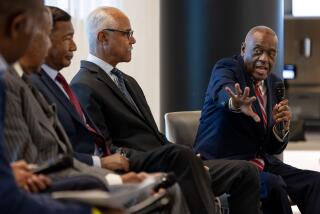ROTC Officer Unaware of Draft Notice : Clinton: The man whose action kept the future governor in school says he was not told of 1969 induction letter. Draft board insists none was sent.
- Share via
LITTLE ROCK, Ark. — The colonel who administered the college ROTC program that helped save Bill Clinton from the draft said Sunday that the future Democratic presidential front-runner never mentioned that he had received an induction notice months before he applied for admission.
Retired Lt. Col. Clinton D. Jones, who was responsible for recruiting candidates into the program, said he “relied heavily” on Clinton’s representation of his draft status--that he was classified 1-A and needed a deferment in 1969 because the local draft board intended to call him for military service.
Had Clinton disclosed the fact that he had already received a draft notice, Jones said, he would have urged rejection of his application for ROTC at the University of Arkansas law school. Jones said he first learned about Clinton’s induction letter while watching television Sunday morning.
“I think Bill Clinton should be more forthright with a lot of people,” Jones said Sunday in a telephone interview from his home in South Carolina. “I think that’s his problem.”
Late Saturday night, Clinton’s campaign said the candidate received a letter of induction from the Hot Springs, Ark., draft board while he was studying at Oxford in England in April, 1969. The campaign issued the statement after Little Rock attorney Cliff Jackson showed The Times old letters Jackson had written to friends describing Clinton’s draft notice and Clinton’s attempts to avoid the draft. Jackson, who was a friend of Clinton when both were at Oxford, now opposes Clinton’s bid for the White House.
By Sunday afternoon, however, Clinton’s deputy campaign manager, George Stephanopoulos, had backtracked, saying Clinton was not sure the letter he received in England was an official induction notice. Stephanopoulos said the letter could have been his notice to take a pre-draft physical exam.
Clinton himself referred to the letter as an “induction notice” and a “draft notice” as he campaigned on Sunday in New York.
He said he had not intended to deceive anyone by failing to disclose that he had received it. “I would gladly have told you this,” he said, “if it had even occurred to me that this was relevant.”
Jones said the existence of Clinton’s induction notice would have been extremely relevant nearly 23 years ago, when the then-Rhodes scholar interviewed with him for a spot in the ROTC program.
“If he had a valid letter of induction, no, we wouldn’t have taken him,” said Jones, who served as director of procurement for the law school’s ROTC program from 1967 until 1970.
“The draft board was doing its job. They had the same job I did: They had the job of procuring bodies,” he said. “They got quotas, and if this was a man they felt should go, I don’t think we would have touched somebody like that.”
Jones said he took Clinton’s representation of his draft status at face value because the future Arkansas governor was highly regarded, even as a student. It was based on that representation that Jones told The Times last week that Clinton never received an induction letter.
“Arkansas was very proud of Bill Clinton,” Jones said. “(He was) a graduate of Georgetown and a Rhodes Scholar. . . . This was a man who was well known and well thought of and the state of Arkansas was very proud.
“This is a man who didn’t walk in and say, ‘Hey, I want to get out of the draft,’ ” Jones added. “This was a man of high character and high qualifications, the type you want in your program. I accepted his word, and the word of the man in the (state) draft headquarters in Little Rock, that (Clinton) was classified 1-A and was going to be drafted and couldn’t go back to England.”
Asked if he had any response, Stephanopoulos, Clinton’s deputy campaign manager, said the governor “did not conceal anything” from ROTC officials, who were in constant contact with the draft board and should have known about all matters pertaining to Clinton’s draft status. Stephanopoulos said Clinton told him he had never interviewed with Jones.
Told about this, Jones declared: “If Bill Clinton said he did not talk to me, that’s a flat lie. . . .”
Jones said he interviewed Clinton for 30 minutes. “Now he’s calling me a liar,” Jones said, “and I won’t stand for that.”
The retired colonel said he believed at the time that Clinton “deserved” a second year at Oxford and agreed to admit him to the ROTC program in exchange for the student’s promise that he would come back and attend the University of Arkansas law school the following year, 1970.
By enrolling in the ROTC program, records show, Clinton obtained a deferment on Aug. 7, 1969. The new status protected him during the next two months, when officials said his age would have virtually guaranteed his induction into the Army. Clinton has said he had a change of heart and asked that his deferment be canceled so he could take his chances on the draft, just as did other young men from his hometown.
Records show he was restored to 1-A status on Oct. 30, but Jones said the reclassification meant little, since Clinton continued to be shielded from the draft by his contract with ROTC.
By that time, Clinton’s chances of being drafted were further diminished, because President Richard M. Nixon had announced that graduate students would be exempt from the draft that year. On Dec. 1, Clinton received a high number in the first draft lottery.
The ROTC program subsequently released Clinton after he wrote a letter Dec. 3 to Jones’ boss, Col. Eugene Holmes, thanking him for “saving me from the draft” and admitting he may have been deceptive about the depth of his anti-war feeling when he enrolled in the program.
Holmes could not be reached for comment Sunday.
Although Clinton’s ROTC file has been destroyed, Jones said he was so angered by the letter that he kept a copy. He released it to ABC News in February, forcing the candidate to confront the politically damaging issue on the eve of the New Hampshire primary.
Despite Clinton’s admission that he received the induction notice, the former secretary for his local draft board continued to maintain Sunday that no such letter was sent to him.
“I don’t care what he says,” Opal Ellis said. “He did not receive his notice of induction.”
Staff writers Richard E. Meyer in Little Rock, Ark., and David Lauter and Doug Jehl in New York contributed to this story.
More to Read
Sign up for Essential California
The most important California stories and recommendations in your inbox every morning.
You may occasionally receive promotional content from the Los Angeles Times.













